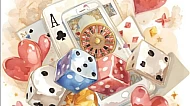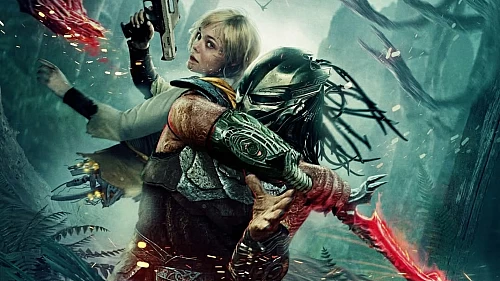This post was published by a guest. The views expressed are those of the author and do not necessarily reflect the views of Scified.com.
Dramatic Bluffing: Pure Fiction
Bluffing gestures in TV shows lean heavily on dramatization. Players pause unnaturally, deliver smirks, or throw out loaded one-liners like, "You'll regret folding." These cues work for storytelling but fall apart in real poker games. Hesitations, for instance, tend to signal nervousness over holding a legitimate hand rather than bluffing. In real environments, bluffers aim to stay under the radar, not create a spectacle.
Misleading Arm Movements and Table Gestures
TV shows frequently exaggerate the role of physical gestures in bluffing, portraying players fidgeting with chips or dramatically riffling them to appear confident. In real-life poker, such actions can lead to accidental tells but are unreliable as consistent indicators of bluffing. Effective bluffing relies more on mental strategy and understanding opponents' tendencies than flashy movements.
For instance, mastering how to play poker involves recognizing true betting patterns over visual distractions. Relying on dramatic table gestures, as depicted in shows, creates false expectations. Professionals rarely base decisions on arm movements alone, favoring logical deductions instead.
Overacting Body Language
Shaking hands, clenched jaws, or darting eyes make for entertaining TV. However, skilled players are adept at controlling body language—or even faking tells. Professionals might intentionally tremble or look nervous to appear weak when they're actually sitting on a monster hand.
Speech Play Overblown
Television loves verbal bluffs, such as a player brazenly claiming, "Go ahead, call. I want you to." In real poker, this is rare and risky because it can give free information or tilt an opponent into unpredictability. A memorable example comes from the 2017 WSOP Main Event, where a player quipped, "You're going to let me bluff you on national TV?" Most players avoid such tactics entirely, relying on betting patterns and silence to do the talking.
Timing Tells Are No Giveaway
Quick bets and snap calls are wildly misrepresented in TV poker. While shows present them as universal signs of bluffing, timing tells in reality are far more nuanced. A hasty bet can occasionally indicate weakness, but it can also reflect strength born of confidence. Any timing-based assumption must be cross-checked against a player's historical tendencies and the game situation.
The Myth of River Raises
Television poker often dramatizes massive river bluffs as a hero moment. In real-life gameplay, raising on the river (especially with air) is a rare, calculated move. It's a high-stakes bluff reserved for spots where the board, opponent tendencies, and pot size all align perfectly. Professionals would view floating someone's river bet lightly—a trope overused in TV poker—as reckless and amateurish.
Errors in Player Profiling
TV poker frequently assumes a one-size-fits-all approach to bluffing. Professionals are portrayed as hyper-aggressive, amateur players as overly cautious, and everyone in between as overly emotional. Real games require precise player profiling. Bluffing successfully hinges on tailoring tactics to opponents, something rarely captured accurately in TV productions.
Emotional Manipulation Backfires
Television shows love to lean into emotional conflict at the poker table. Bluffing is sometimes depicted with players throwing out anger-fueled lines or baiting opponents into making bad decisions. This rarely works in real poker. Emotionally charged table talk can have unpredictable effects, often turning a predictable opponent into someone erratic and hard to read.
Betting Patterns Reveal All
Unlike on TV, real players know bluffing isn't about posturing; it's about the story your betting tells. Double-barrel bluffs—betting the flop and turn without a strong hand—are useful but not universal. They depend heavily on board textures and targeting specific player types. While TV overdramatizes such moves, good players execute them sparingly, knowing the risk of being called by experienced opponents.
The Complexity of Bluff Detection
TV often simplifies bluffing into binary terms: you're either bluffing or not. Real poker involves ambiguous scenarios where actions don't fit neatly into one category. A player betting strong might be semi-bluffing with a draw or value-betting a marginal hand. Simplified TV portrayals gloss over the complexity that goes into real-world decision-making.
By leaning too heavily on exaggerated tells and gestures, TV bluffing skips over the cerebral aspects of poker. Real success at bluffing comes less from drama and more from context, timing, and seamless consistency—factors that require more depth than screenwriting typically allows.

Sci-Fi Conventions Reveal Exclusive Behind-The-Scenes Content
Fans were buzzing all week about San Diego Comic‑Con 2025 and everything it revealed. From trailers to sneak previews and creator chats, the excitem...

The Economics of Credit-Based Dating: Estimating Real Costs Before They Estimate You
Credit-based dating platforms can feel deceptively light at the door: sign up, browse profiles, get messages quickly, and only then discover that mean...

How Sci‑Fi Culture Inspired Future Tech Careers and Online Work in 2026
Explore how science fiction influences technology careers and online work in 2026, linking future tech inspiration with real opportunities and remote talent platforms.

Benefits of Using the Mobile Client: An Analysis of the 1x Casino App Download
Playing casino games on your phone should be quick, safe, and actually enjoyable (not a chore). The 1x Casino mobile client aims to package your accou...

CryptoEasily launches stable-yield cloud mining contracts, creating a new way for BTC and XRP holders to earn $7,700 per day.
As the price of Bitcoin and the value of XRP continue to decline, with Bitcoin falling below $75,000 and XRP dropping to around $1.50, market sentimen...


